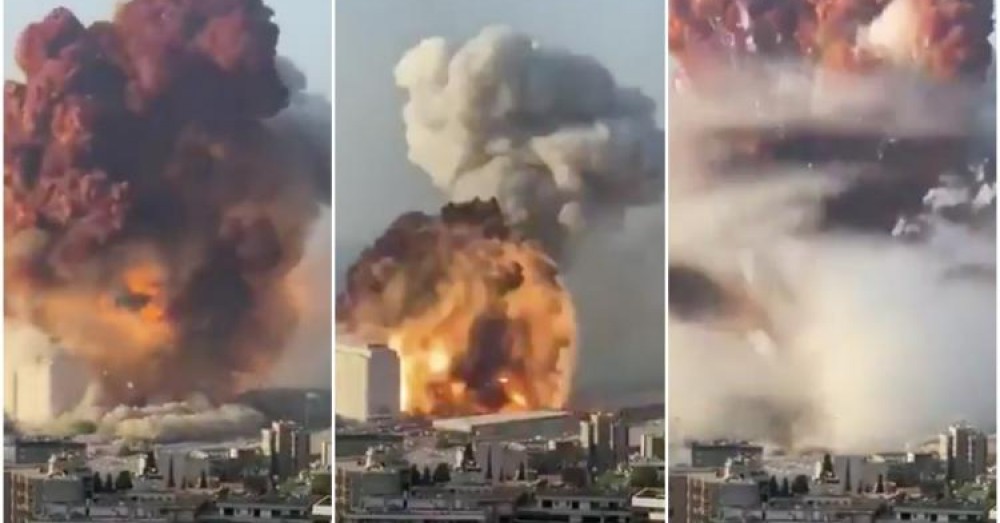The death toll from a massive explosion that rocked Beirut and flattened much of the city's port has passed 100, according to the Lebanese Red Cross.
Thousands more people were injured and buildings across Lebanon's capital city were damaged in the blast.
Many bodies are still buried in the rubble created by the blast, which struck at the force of a 3.5 magnitude earthquake.
Prime Minister Scott Morrison confirmed today that at least one Australian had been killed in the "absolutely devastating" blast.
Among the 3000 injured included a number of staff from Australia's Department of Foreign Affairs (DFAT).
DFAT confirmed those involved only suffered minor injuries and all were accounted for and being treated.
The department is still working on the ground to gather information about any other Australians who may be affected.
Officials said it was not yet clear what caused the explosion, which was heard and felt as far away as Cyprus more than 200 kilometres across the Mediterranean.
Lebanon's interior minister said it appeared that a large cache of ammonium nitrate in the port had detonated.
'This country is cursed'
Beirut hospitals quickly filled beyond capacity, pleading for blood supplies and generators to keep their lights on.
The sudden devastation overwhelmed a country already struggling with both the coronavirus pandemic and a severe economic and financial crisis.
For hours after the explosion, the most destructive in all of Lebanon's troubled history, ambulances rushed in from around the country to carry away the wounded.
Hospitals quickly filled beyond capacity, pleading for blood supplies, and generators to keep their lights on.
For blocks around the port, bloodied residents staggered through streets lined with overturned cars and littered with rubble from shattered buildings.
Outside one hospital Omar Kinno held back tears as he revealed one if his sisters was killed when the explosion rocked their apartment, while another sister's neck was broken.
Mr Kinno's injured mother and father were taken to a hospital but he didn't know which, and he was making calls trying to track them down.
"I have no idea what happened to my parents. I am totally lost," he said.
The UN peacekeeping mission in Lebanon, UNIFIL, said one of its ships in the port was damaged and a number of its peacekeepers were injured, some seriously.
One woman covered in blood from the waist up walked down a trashed street while talking furiously on her phone.
On another street, a woman with a bloodied face looked distraught, staggering through traffic with two friends at her side.
"This country is cursed," a young man passing by muttered.
Ammonium nitrate: possible cause
Windows and doors were blown out kilometres away, including at the city's only international airport. Army helicopters helped battle fires raging at the port.
Interior Minister Mohammed Fahmi told a local TV station that it appeared the blast was caused by the detonation of more than 2700 tonnes of ammonium nitrate that had been stored in a warehouse at the dock ever since it was confiscated from a cargo ship in 2014.
Witnesses reported seeing an orange cloud like that which appears when toxic nitrogen dioxide gas is released after an explosion involving nitrates.
Videos showed what appeared to be a fire erupting nearby just before, and local TV stations reported that a fireworks warehouse was involved.
The fire appeared to spread to a nearby building, triggering the more massive explosion, sending up a mushroom cloud and generating a shock wave.
Lebanese Prime Minister Hassan Diab said that an estimated 2750 tonnes of ammonium nitrate had been stored at a warehouse in Beirut for six years, according to a statement published on the Republic of Lebanon Presidency website.
Ammonium nitrate is a key ingredient in both fertiliser and certain types of explosives. The substance has been used in terror attacks, including the bombing of the Alfred P. Murrah Federal Building in Oklahoma City in 1995.
It's still unclear what exactly caused the explosion. The blast was earlier blamed on a fire that broke out.
Lebanon's General Security Chief Abbas Ibrahim said earlier "highly explosive material" that had been confiscated years ago was being stored in the warehouse, which is just minutes' walk from popular shopping and nightlife districts.
Prime Minister Diab said in the statement it was "unacceptable" that so much explosive material was stored in a warehouse "without taking preventive measures while endangering the safety of citizens."
One Australian dead
At least one Australian has been killed in the blast, Prime Minister Scott Morrison told Today.
"Our hearts go out to all of those in Lebanon and in Beirut in particular at the moment," Mr Morrison told Today.
"You can see from the image of the blast it is just absolutely devastating. But beyond that, as we know, there are hundreds of thousands of Australians who have Lebanese descent and they will be concerned about family members.
"Our hearts really go out to our Lebanese Australian community. I know there will be many prayers in the churches and the mosques in Australia, but again, given the COVID restrictions, I would just urge the appropriate response, those private prayers this morning will be the ones that people will be offering and so will I."
All of the staff from the Australian Embassy in Beirut are accounted for and have sustained minor injuries like cuts and scratches, Mr Morrison.
The building itself has been "impacted significantly," he said.
Share This Post















